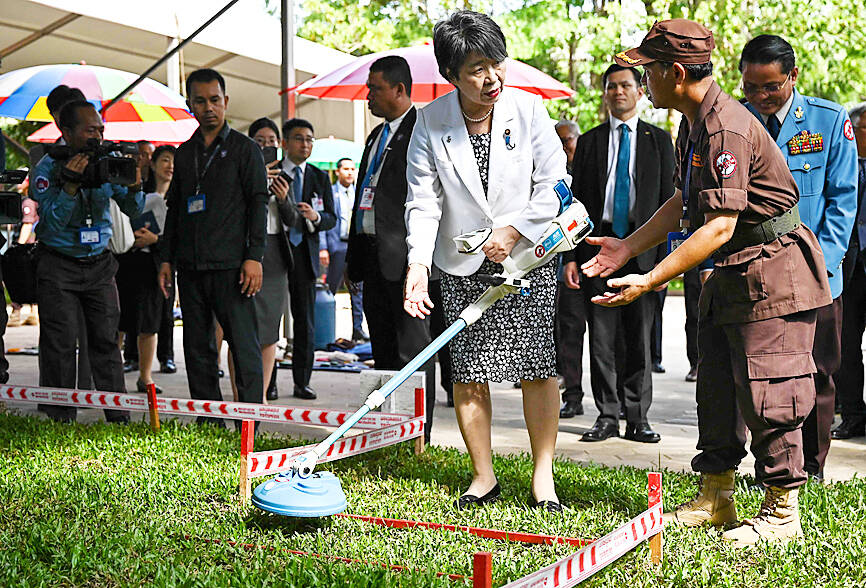Japanese Minister of Foreign Affairs Yoko Kamikawa on Saturday announced a joint project with Cambodia to share knowledge and technology on land mine removal with countries around the world, including Ukraine.
Kamikawa visited the Cambodian Mine Action Center, which was formed in the 1990s at the end of the Southeast Asian nation’s decades of civil war. It seeks to deal with an estimated 4 to 6 million land mines and other unexploded munitions left strewn around the countryside.
There she said: “Cambodia, which has steadily advanced mine removal within its own country, is now a leader in mine action around the world.”

Photo: AFP
Japan has consistently cooperated in Cambodia’s mine removal since the civil war, she added.
Cambodian deminers are among the world’s most experienced, and several thousand have been sent in the past decade under UN auspices to work in Africa and the Middle East. Cambodia in 2022 began training deminers from Ukraine, which also suffers from a high density of land mines and other unexploded munitions as the Russian invasion drags on.
“As a concrete cooperation under the Japan Cambodia Landmine Initiative, Japan will provide full-scale assistance to humanitarian mine action in Ukraine,” she said. “Next week, we will provide Ukraine with a large demining machine, and next month, here in Cambodia, we will train Ukrainian personnel on how to operate the machine.”
Non-governmental organization Landmine Monitor in its 2022 report listed Cambodia and Ukraine among nine countries with “massive” mine contamination, meaning they had more than 100km2 of uncleared fields.
Since the end of the fighting in Cambodia, nearly 20,000 people have been killed and about 45,000 have been injured by leftover war explosives, although the average annual death toll has dropped from several thousand to less than 100.
Despite a very active demining program, many dangerous munitions remain in place, posing a hazard to villagers.
Cambodia’s training of Ukrainian deminers, in Poland as well as Cambodia, came after former Cambodian prime minister Hun Sen — in an unusual move for a nation that usually aligns itself with Russia and China — condemned Moscow’s invasion of Ukraine, saying: “Cambodia is always against any country that invades another country.”
Cambodia was one of nearly 100 UN member countries that cosponsored a resolution condemning Russia’s invasion.
Several other countries, including the US and Germany, have already provided Ukraine with demining assistance.
Kamikawa also held talks with Cambodian Prime Minister Hun Manet and Hun Sen, his father, who stepped down last year after ruling for 38 years.
She and Cambodian Minister of Foreign Affairs Sok Chenda Sophea, who is also deputy prime minister, signed agreements for a concessional loan from Tokyo of up to ¥8.3 billion (US$51.6 million) for upgrading the highway between the capital, Phnom Penh, to the border with Thailand, and grant aid up to ¥386 million to support junior administrative officials to study in Japan, the Japanese embassy in Cambodia said in a statement.
Kamikawa next goes to the Philippines, where she and Japanese Minister of Defense Minoru Kihara are today to hold talks with their Philippine counterparts. They are set to discuss signing a mutual defense pact that would allow each country to deploy troops on the other’s territory.

The death of a former head of China’s one-child policy has been met not by tributes, but by castigation of the abandoned policy on social media this week. State media praised Peng Peiyun (彭珮雲), former head of China’s National Family Planning Commission from 1988 to 1998, as “an outstanding leader” in her work related to women and children. The reaction on Chinese social media to Peng’s death in Beijing on Sunday, just shy of her 96th birthday, was less positive. “Those children who were lost, naked, are waiting for you over there” in the afterlife, one person posted on China’s Sina Weibo platform. China’s

‘NO COUNTRY BUMPKIN’: The judge rejected arguments that former prime minister Najib Razak was an unwitting victim, saying Najib took steps to protect his position Imprisoned former Malaysian prime minister Najib Razak was yesterday convicted, following a corruption trial tied to multibillion-dollar looting of the 1Malaysia Development Berhad (1MDB) state investment fund. The nation’s high court found Najib, 72, guilty on four counts of abuse of power and 21 charges of money laundering related to more than US$700 million channeled into his personal bank accounts from the 1MDB fund. Najib denied any wrongdoing, and maintained the funds were a political donation from Saudi Arabia and that he had been misled by rogue financiers led by businessman Low Taek Jho. Low, thought to be the scandal’s mastermind, remains

‘POLITICAL LOYALTY’: The move breaks with decades of precedent among US administrations, which have tended to leave career ambassadors in their posts US President Donald Trump’s administration has ordered dozens of US ambassadors to step down, people familiar with the matter said, a precedent-breaking recall that would leave embassies abroad without US Senate-confirmed leadership. The envoys, career diplomats who were almost all named to their jobs under former US president Joe Biden, were told over the phone in the past few days they needed to depart in the next few weeks, the people said. They would not be fired, but finding new roles would be a challenge given that many are far along in their careers and opportunities for senior diplomats can

Australian Prime Minister Anthony Albanese yesterday announced plans for a national bravery award to recognize civilians and first responders who confronted “the worst of evil” during an anti-Semitic terror attack that left 15 dead and has cast a heavy shadow over the nation’s holiday season. Albanese said he plans to establish a special honors system for those who placed themselves in harm’s way to help during the attack on a beachside Hanukkah celebration, like Ahmed al-Ahmed, a Syrian-Australian Muslim who disarmed one of the assailants before being wounded himself. Sajid Akram, who was killed by police during the Dec. 14 attack, and